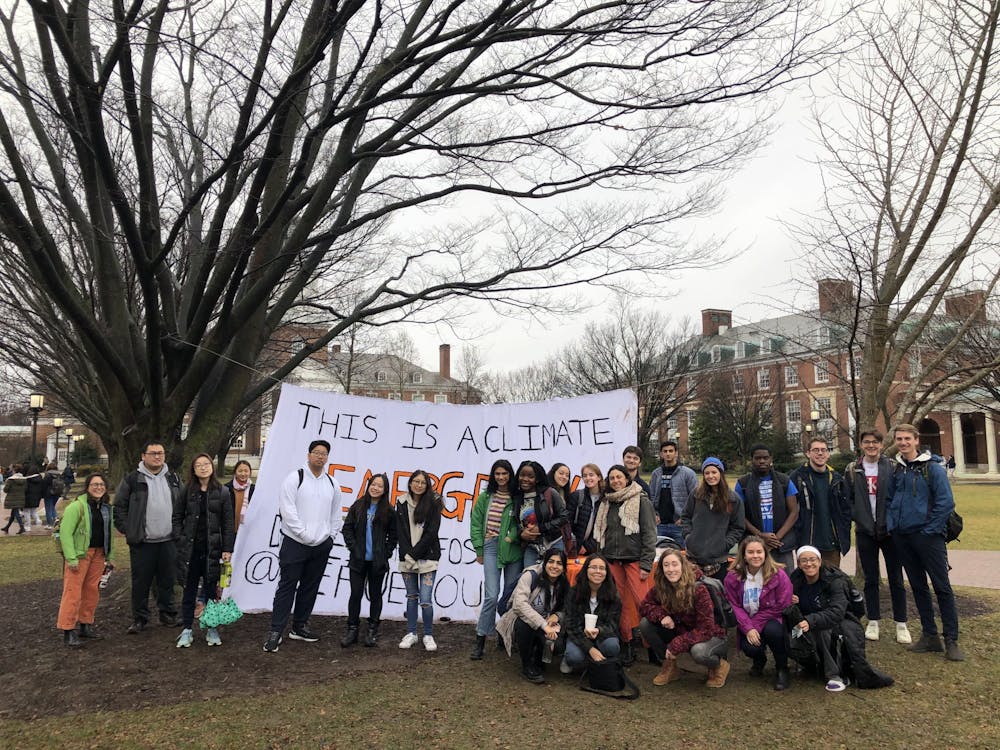Student activists around the country participated in Fossil Fuel Divestment Day (F2D2) on Thursday, Feb. 13. Refuel Our Future (Refuel), an environmental activist group on campus, hosted the event on Keyser Quad.
F2D2 is part of a national movement created by Divest Ed, a training and strategy hub. Freshman Haadiya Ahmed explained that she came out to support F2D2 because it is, she believes, one of the best ways for young people to protest the negative effects of fossil fuels.
“Climate change is a real thing, and fossil fuels contribute the most to that issue, and since we are college students, an event like this is the greatest way to make an impact,” she said.
Hopkins has held long-standing investments in the fossil fuel industry, which have proven to be a large point of contention between the University administration and student groups.
Junior Molly Radwell, a member of Refuel, stated that this event acted as a reminder that there is a large community at Hopkins pushing for the University to divest in fossil fuels — not just members of Refuel.
“We are here to show solidarity and unity with the movement against fossil fuels, that there is momentum being gained for divestment and to show that there is a large portion of Hopkins students in support of divestment,” she said.
In December 2017, the University’s Board of Trustees voted to divest its endowment from thermal coal three months after the Public Interest Investment Advisory Committee (PIIAC) recommended that the University divest from all fossil fuels. PIIAC, a group of undergraduates, graduate students, faculty and staff from across University divisions, released these recommendations six years after Refuel began campaigning.
The vote to divest exclusively from thermal coal has been criticized. Many believe this decision was insufficient, pointing to the coal industry’s decline at the time of the divestment.
Refuel member Sam Mollin hopes that a public display of student activism may motivate the University to divest.
“The Board of Trustees re-voting depends on student support and whether or not they realize the drastic economic implications of fossil fuels,” Mollin said.
In December 2019, however, University President Ronald J. Daniels told The News-Letter that a re-vote in the near future is unlikely.
“This is something that commanded a fair amount of time and attention a few years ago, but to the extent that there’s a significant set of new arguments or new data that should cause a rethinking of that position, we’re listening,” he said.
According to Mollin, past statistics supporting divestment remain true. He also noted that a recent report from the Intergovernmental Panel on Climate Change, a body of the United Nations, detailed the extreme effects of climate change.
Georgetown University’s board of directors voted on Feb. 6 to divest their endowment from fossil fuel companies. Radwell suggested that this decision could pressure Hopkins to do the same.
“If larger institutions, like Hopkins or Georgetown, have fossil fuel money invested through mutual funds, it can be an excuse that it’s harder to divest because the money’s caught up in portfolios that are managed by third parties,” she said. “Georgetown divesting shows that mutual funds shouldn’t be an inhibitor.”
Junior Kim Robins added that she believed student activists could push Hopkins to divest.
“Any public display of support for a movement like this will at least lead to a serious investigation of a way that the administration can reduce its dependence on fossil fuels,” she said.
Robins underscored the need for the University to rethink its investments.
“The climate crisis is the biggest issue that we are facing currently... Fossil fuels are neither sustainable nor equitable, and they are not in keeping with a world that survives,” she said.
In addition to students, Refuel member Jeremy Berger mentioned seeing University leaders and security guards at the event.
“Four people from the administration and security observed our demonstration today, which shows that the administration is afraid of the powerful movement we are a part of, and of student protests, especially since the Sit-In,” he said.
The month-long occupation of Garland Hall in protest of the JHPD ended in May with the arrests of seven people, including four students.
Karen Lancaster, assistant vice president of external relations for the Office of Communications responded to Berger’s claims in an email to The News-Letter.
“It’s longstanding practice for administrators and security personnel to staff student events of all kinds on campus, including protests... It is their practice to attend them to hear students’ concerns and to ensure adherence to established parameters. A security presence at protests is standard to help ensure the safety of all of those in the community,” she wrote.
Refuel member Laís Santoro reflected on the role the University plays when it comes to climate change.
“If Hopkins wants to help stop climate change, then it’s important to stop supporting this industry that exploits indigenous people and our Earth,” she said.
Radwell agreed with Santoro.
“We have shown repeatedly that divestment is feasible and financially beneficial, but administration has ignored this so we are trying to work a different angle and show that there is incredible student support,” she said.
Rudy Malcom contributed reporting to this article.





